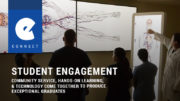By Dr. Kat Prince, ECPI University Vice President of Academic Affairs
Learning theory principles haven’t changed much since John Dewey wrote Democracy in Education, An Introduction to the Philosophy of Education in 1914, followed by Malcolm Knowles’ research on the adult learner published in 1973 (The Adult Learner: A Neglected Species). Both of these great thinkers built the foundation for learning science – the foundations of pedagogy (Dewey) and andragogy – understanding how adults learn (Knowles). At the risk of oversimplifying their contributions, there are important similarities between these learning theories. For one, effective learning occurs when the experience is active and relevant. Dewey said, “Give students something to do, not something to learn; and the doing is of such a nature as to demand thinking; learning naturally occurs.” Adult learners need to know why the content is important, why it’s relevant. Providing information in chunks, frequent and constructive feedback from instructors, opportunities for reflection, and time for collaboration with peers are also keys to success.
“Give students something to do, not something to learn; and the doing is of such a nature as to demand thinking; learning naturally occurs.”
~John Dewey, American Philosopher, Psychologist, and Educator
The work of Dewey and Knowles continues to evolve as we learn more from cognitive scientists about learning. As John Dewey said, “If we teach today’s students as we taught yesterday’s, we rob them of tomorrow.” Obviously, our world is considerably different than it was 100 years ago…or even ten years ago! At ECPI University, we take the student experience seriously. We construct the learning environment to optimize student success. And not surprisingly, just as the fathers of education discovered, keeping learning real, challenging, engaging, and active are critical to success. ECPI University students receive hands-on, engaging, relevant experiences. We do this through amazing technology such as KUKA robots, the MILO range, Anatomage Tables, virtualizations, simulations, and gamification. We use adaptive learning technology in many of our courses to meet learners where they are, individualizing the learning experience. We also offer ways for learners to engage with future employers through externships and clinical rotations, serve the community through volunteerism, and participate in professional competitions.
[Tweet “We also offer ways for learners to engage with future employers through externships and clinical rotations, serve the community through volunteerism, and participate in professional competitions.”]
We have access to more information than ever before. It can be overwhelming and confusing. Faculty must decide how best to meet program outcomes; students must quickly ingest and use the information to demonstrate that learning has occurred. This process can be daunting. The good news is that we have myriad tools and techniques available to us to optimize the learning experience. Students learn more deeply, faster, and are better prepared for success thanks to the ways ECPI University optimizes the advances of learning science and technology.








Be the first to comment on "Learning Theory Meets Modern Application in ECPI University Classrooms"